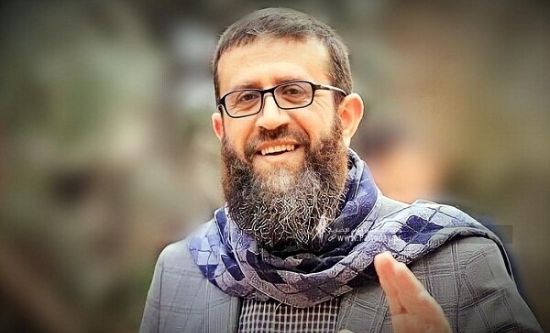
On 2 May 2023, after a gruelling 87-day hunger strike and a lifetime of struggle for the Palestinian cause, leading political prisoner Khader Adnan lost his life at the hands of the Zionist regime at Ramle prison. He was mourned in the cell blocks and on the streets, while the masses pledged to continue his fight. In recent years, many Palestinian hunger strikers have been victorious in their battles against the state, winning reprieves and stints of freedom; that such fighters are frequently re-arrested proves both their leading role in the liberation movement and the callous nature of the occupation. This time the Zionist state was not prepared to concede, and instead killed Khader Adnan, making him the first Palestinian prisoner to die on hunger strike since 1992.
Assassinated PFLP leader Abu Ali Mustafa, who was also born in Adnan’s hometown of Arraba, once stated that the ‘the fightback is a constant, while the means and tactics are its variables’. Though he would join Islamic Jihad during his student activist days rather than the PFLP, Adnan came to embody this motto. Arrested a dozen times since 1999 and imprisoned for a total of eight years, his final hunger strike was his sixth. During this and other periods of internment, he was routinely denied medical treatment, while his family members were subject to home raids and violent harassment and intimidation by the Zionists.
By May 2023, there were 1,006 Palestinians held under ‘administrative detention’ – internment without charge or trial – the highest number in three decades. Having been held under this system previously, Adnan’s arrest on 5 February carried the more serious accusation of incitement to violence and membership of an illegal organisation. It was claimed, spuriously, that Adnan had ties to commando units, yet his role in the Islamic Jihad leadership was political rather than military. Islamic Jihad pointed out that the arrests of Adnan and his comrade Khaled Gawadreh reflected ‘the extent of confusion and pressure that is persecuting the fascist occupation government, as a result of the escalation of the uprising in Jerusalem and the occupied West Bank’.
The Netanyahu government responded to rising militancy with a call for all-out war on Palestinian resistance factions. Faced with no legal route out of a threatened long-term sentence, this hunger strike would mean freedom or death. Alongside other protesting inmates in the occupation prisons, Adnan faced the war from his cell, bearing the brunt of the regime’s malicious reprisals. His wife Randa Mousa reported that 80 days into the hunger strike Adnan lost consciousness, and that the Zionist screws left him unconscious for half an hour before attempting to resuscitate him.
Though Adnan was formally mourned by Palestinian Authority (PA) Prime Minister Mohammad Shtayyeh, who labelled his death a ‘deliberate assassination’, Adnan had also been on the receiving end of PA repression. In 1999, PA forces arrested him for his role in leading student protests against the Ramallah visit of pro-Israel French Prime Minister Lionel Jospin. Adnan was interned on at least two other occasions by the PA. The actions of the comprador bourgeoisie PA have been further exposed alongside Israel’s murderous attempts to destroy the new wave of armed resistance. Emerging in 2022, the Lions’ Den organisation has built a huge support base, as an alliance of groups defending Nablus, Jenin and other areas from Zionist attacks. In October 2022 it emerged that the PA had attempted to persuade the group to sell its weapons and integrate themselves into PA security forces. The Lions’ Den refused.
In May 2023, Israeli bombings killed 33 in Gaza, including six children, destroying medical facilities and homes in what it claimed were ‘targeted attacks’ against Islamic Jihad leaders. By 22 May, 160 Palestinians had been killed in Zionist attacks so far this year. The growing unity of action in the face of racist government repression has given rise to the Joint Operations Room, bringing together nationalist, Islamic and socialist resistance factions in coordinated action to beat back the Zionist onslaught. Mass support for the liberation movement is a major factor in Israeli state targeting of Islamic Jihad and attempting to decapitate the resistance. In the wake of the May ceasefire, huge street mobilisations took place in open support for the armed struggle including, significantly, mass rallies among displaced Palestinians in Syria and Lebanon.
Though the 1993 Oslo peace deal between Israel and the PLO led to publicity shots of the release of many Palestinian political prisoners, over 142,000 have been interned since then. Others remained behind bars throughout years of PA wrangling with the Zionists and imperialists. Activist and intellectual Walid Daqqa has been imprisoned since 1986 and is now terminally ill with cancer. In recent months his condition has gravely worsened due to continued medical neglect, while the regime denies him parole.
The treatment of Walid Daqqa and the killing of Khader Adnan are a reflection of the Zionists’ fear of Palestinian resistance and the, as yet, unresolved contradictions in the liberation movement. Upon Khader’s death, Randa Mousa declared that ‘Whoever has a weapon should have used it before the sheikh died,’ rather than merely in retaliation. The movement for liberation remains within the grasp of those organising on the ground. By their hands, aided by internationalist solidarity, Palestine and its imprisoned heroes will be free.
Louis Brehony




